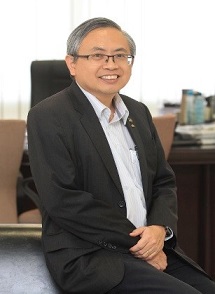

The Covid-19 pandemic is, first and foremost, a health crisis that has caused many changes since the beginning of the year 2020. Many countries implemented movement control order (MCO) which created severe short-term disruption worldwide. It is also an undeniable fact that this disruption has forced institutions of higher learning and companies to fast track their digital transformation to accommodate and to survive through the crisis period. The Covid-19 pandemic has spurred technology innovation and adoption, the rise in contactless technology, and changes in not only the business, but the research world as well.
The 4th Industrial Revolution represents the emergence of new wave of science discovery, technology breakthrough and innovation. It has transformed the focus of many research projects and it is changing the mind sets of researchers, including those in UTAR, who take into consideration the future outcomes of their research and the impact it has on the society and environment.
Over the coming months in 2021, the university will finalise the proposals in the UTAR Research and Development (R&D) Roadmap for the next 10 years (2022 - 2032). This Roadmap is the start of a big conversation on what actions need to be taken and how we can maximise the economic, environmental and societal impact of research through effective application of new knowledge.
UTAR’s focus on teaching and research excellence has earned the university much recognition especially at the Times Higher Education World University Rankings Asia 2021 where UTAR is now ranked 119th. UTAR maintained its Times Higher Education (THE) Impact Rankings 2021 with a ranking of 201–300 overall for the second year. UTAR is also ranked 74th (Top 100) out of the 966 institutions listed in the SDG 4: Quality Education table. The Times Higher Education 2021 Impact Rankings is the third edition and the overall ranking includes 1,115 universities from 94 countries/region. This latest ranking is a reflection of the university’s strategic achievement and its direction in the right path in support of the SDGs.
UTAR is ranked #801-1000 in the Quacquarelli Symonds (QS) World University Rankings 2022 and ranked #157 in the Quacquarelli Symonds (QS) Asia University Rankings 2021, up 24 places from its ranking of #181 in the QS Asia University Rankings 2020. This is a significant increase for UTAR who has always aimed for excellence in its educational, research and internationalisation initiatives.
The university is proud of the many committed researchers, whose dedication has earned them much praise and many accolades. Many have won national, regional and international awards and have gained the respect of experts from the industry. Their passion for research and their contributions in their field of expertise have added to the strong repute of the university, enhancing the foundation of the university for the people, by the people.
The previous year was filled with many meaningful projects and activities with our researchers as they manoeuvred through the pandemic. It is with pride that I present to you the following highlights in the UTAR R&D Annual Report 2020:
These are just a few of the many accomplishments in R&D, and the university is certainly constantly evaluating for improvements and expansion including developing a cooperative research framework with other institutions and professions. We have signed over 450 memorandum of understandings with foreign and local universities and industry partners to facilitate research collaborations, mutual educational visits, academic and student exchanges, and joint developments in teaching methodologies.
In light of the COVID-19 crisis, the importance of being able to find ingenious, practical and timely solutions to the most challenging problems is even clearer. Research and Development will be critical to economic and social recovery from the impacts of COVID-19, enabling us to build a greener, healthier and more resilient Malaysia.
I would like to also sincerely thank all the staff members of UTAR for their dedication, resilience, efforts and contributions in pursuing their research projects and collaborations during this challenging time. Let us all stay on-track and remain committed to pursue further collaborative researches that will enable us to seek improvements for the society, the nation and the rest of the world.
Thank you.
With best regards,
Ir. Prof. Dr. Ewe Hong Tat